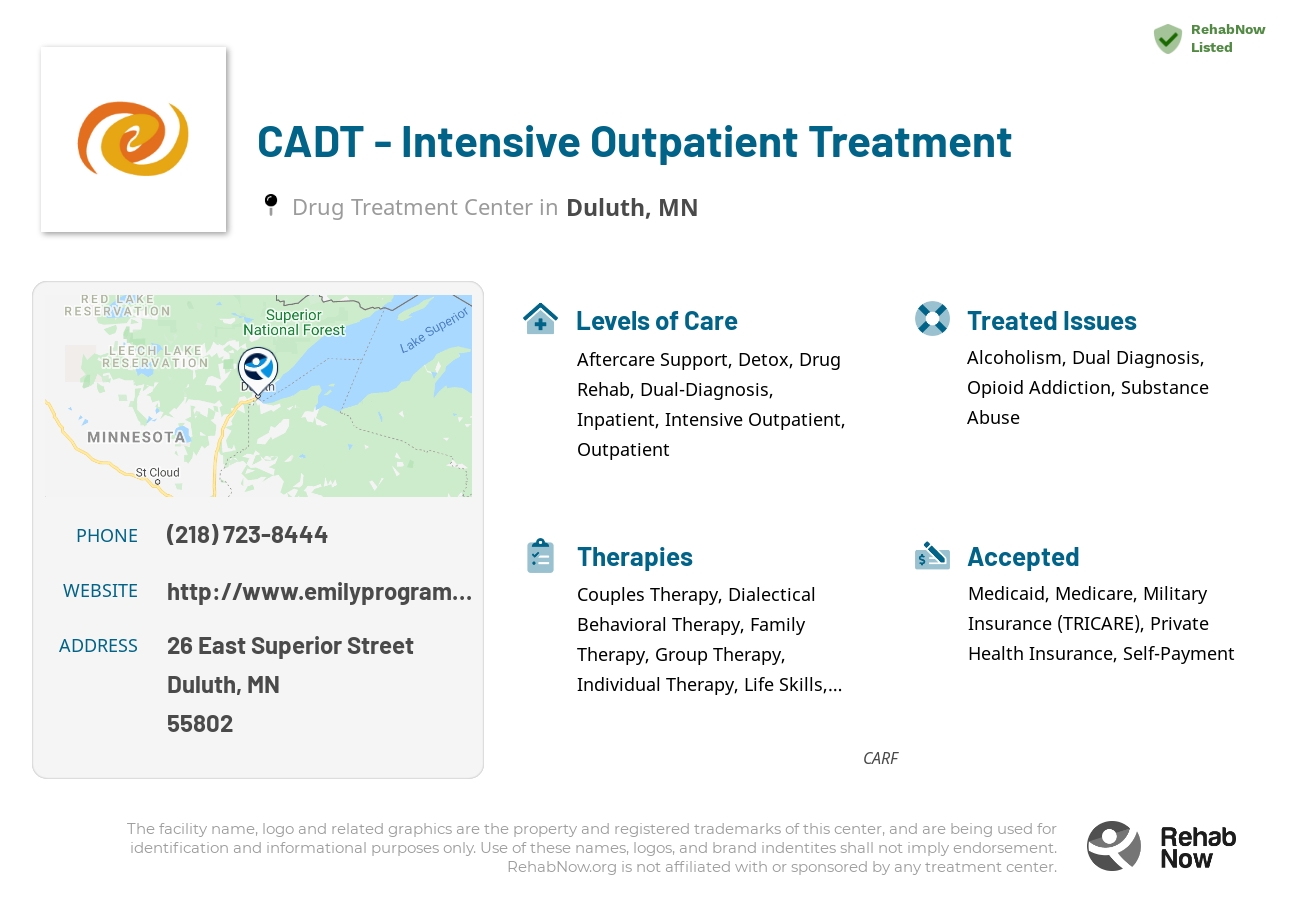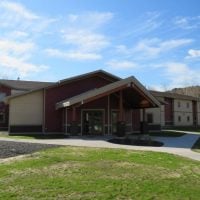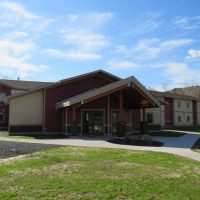CADT - Intensive Outpatient Treatment
Drug Rehab Center in Duluth, Minnesota
CADT's Drug Rehab program provides comprehensive treatment for individuals with alcoholism, dual diagnosis, opioid addiction and substance abuse, accredited by CARF and accepting private health insurance, with specialized staff and custom treatment plans.
About CADT - Intensive Outpatient Treatment in Minnesota
CADT - Intensive Outpatient Treatment in Duluth, Minnesota, stands out for its comprehensive approach to treating substance abuse and addiction. Focused on chemical health, substance abuse, and addiction recovery, it offers a unique blend of services tailored to individuals battling drug, alcohol, or gambling issues. Special attention is given to those needing outpatient treatment or grappling with dual diagnoses.
- Offers a wide range of services from detox to aftercare support, addressing various stages of recovery.
- Specializes in treating co-occurring disorders alongside substance abuse, ensuring a holistic approach.
- Utilizes evidence-based treatment methods, including cognitive behavioral therapy and dialectical behavioral therapy, to foster recovery.
Accredited by CARF, CADT - Intensive Outpatient Treatment underscores its commitment to quality and effective care. With a focus on individualized treatment plans, it caters to those not meeting the criteria for intensive outpatient treatment and provides special services for dual diagnosis cases.
CADT addresses a spectrum of addictions, including substance abuse and opioid addiction, employing a comprehensive treatment approach. Treatment methods range from cognitive behavioral therapy to family therapy, ensuring a multifaceted approach to recovery across various levels of care.
Genders
Ages
Modality
Additional
Accreditations

CARF
The Commission on Accreditation of Rehabilitation Facilities (CARF) is a non-profit organization that specifically accredits rehab organizations. Founded in 1966, CARF's, mission is to help service providers like rehab facilities maintain high standards of care.
Conditions and Issues Treated
Substance abuse creates problems that affect people in Duluth, MN on many levels. First, substance abuse affects the individual who is abusing drugs or alcohol. This can result in health problems, including heart damage and overdose. Substance abuse also affects the user’s family, friends, co-workers, classmates, or peers. These people feel frustrated because they do not know how to help their loved ones struggling with addiction. At the same time, the addict cannot control his behavior. Lastly, friends and family members of addicts are affected financially by substance abuse.
The good news is that effective treatments can help prevent substance abuse or treat its effects on the user. These treatments, which include behavioral therapy and counseling sessions, target the underlying causes of substance abuse, helping users achieve sobriety so they can regain control over their lives. They also teach users to cope with stress in ways other than using drugs or alcohol.
Opioid addiction has become a significant health problem in the United States. When a person’s life becomes unmanageable because of an opioid addiction, treatment can help them get sober. Treatment includes medical care and counseling.
“With so many people struggling with opioid addiction, we need more care and attention for those who want to quit. Opioid addicts often take opioids when they experience a painful injury – that’s how the cycle starts! When someone begins taking their medication differently than prescribed or takes an excessive amount of drugs, it means they’re hooked on drugs and in danger of overdosing.
The most successful way to beat this is through detoxing from these types treatments at CADT - Intensive Outpatient Treatment in . Most facilities start by using medical support during the process while providing counseling services; rehabilitation comes later on after treatment has been completed successfully.
A “dual diagnosis” is when the individual has two medical issues at the same time. The top co-occurring mental disorders with addiction are depression, anxiety, ADHD, bi-polar disorder. Addiction is also considered a mental illness that is not a choice but rather a medical condition. Addiction can be caused by any number of underlying issues.
Dual diagnosis is provided by CADT - Intensive Outpatient Treatment to treat addictive tendencies as well as any untreated mental illnesses. This ensures successful long term health and recovery for patients after treatment has been completed.
Dual diagnosis is provided by CADT - Intensive Outpatient Treatment to treat addictive tendencies as well as any untreated mental illnesses for people in Minnesota. This ensures successful long term health and recovery for patients after treatment has been completed.Levels of Care Offered
This center offers a variety of custom treatment tailored to individual recovery. Currently available are Aftercare Support, Detox, Drug Rehab, Dual-Diagnosis, Inpatient, Intensive Outpatient, Outpatient, with additional therapies available as listed below.
The first level of recovery is detox. It involves giving a person the opportunity to get the toxins out of their body safely. The individual receiving treatment at CADT - Intensive Outpatient Treatment typically will get ill during detox, and they will often start using again to get rid of unpleasant emotions and complicated physical responses. It is why having a Minnesota medical professional present is so critical. A medical professional can make sure that patients do not start using again during detox and stay physically healthy during the process. They will also have treatment on a mental level to relieve their symptoms and guide them through the process.
Going to an inpatient rehab facility means living there while all aspects of addiction or co-occurring disorder get addressed. The treatment involves medical supervision, therapy, and future planning.
This type of rehabilitation provides a drug-free environment for people who struggle with chronic/long-term addiction without having access to drugs outside the center (or their own home). It takes away any distractions because they live there 24 hours per day. If someone is trying to break out old habits, which could lead them back into substance abuse, things like jobs or school can be put on hold until after they complete their stay to focus solely on recovery.
Outpatient addiction treatment is beneficial for people who are able to function well in their day-to-day lives. It is recommended for people who are not yet ready to end their relationships with friends or family members who might be encouraging drug and alcohol use.
Intensive outpatient treatment is beneficial for:
- People who are able to attend treatment more than 3 times per week.
- People who do not meet the criteria for inpatient treatment.
- People who are able to contribute to their own recovery outside of the treatment center.
- People who are motivated towards recovery.
- People who are able to overcome addiction on their own without the need for higher levels of care.
Outpatient programs at CADT - Intensive Outpatient Treatment, the Duluth resident can live with their family while continuing with their job or studies. Treatment includes educating the patient on drug abuse, medications, and counseling sessions at the individual or group level. Outpatient treatment plans cover diagnosis, detoxification, management, and counseling. They are a popular option for those who have graduated from inpatient facilities.
Without aftercare support, addicts can easily relapse back into addiction. It is crucial to integrate the addict back into society. Aftercare support should take place after outpatient treatment has ended.
There are a few different types of aftercare support that patients can seek after completing an inpatient treatment program:
- 12 Step Self-help groups (AA, NA)
- Therapeutic communities,
- Long-term, structured sober living arrangements
- Halfway houses (residential treatment centers)
Many different support groups exist for addicts to seek help after treatment. Some are more effective than others, depending on the person’s addiction, background, and other factors.
Therapies & Programs
Individual therapy is a form of counseling where you meet with a trained professional one-on-one. Meeting with a therapist in this setting allows for a personal and trusting relationship to be built. This allows the patient to open up about sensitive or private issues they may not feel comfortable discussing in a group. Individual therapy helps identify the root causes of your addiction, which can help prevent relapse.
Couples therapy for drug addiction is a unique form of therapy that allows family members to work through the emotional issues of their loved one’s addiction together. Family members can support each other while learning how to cope with the addiction and encourage healthy changes. The two will work with a therapist to learn how the addiction affects themselves and the relationship.
Family therapy is often done alongside drug treatment to help addicts stay sober. The goal of family therapy for drug addiction is to create an environment where communication can happen without judgment, hostility, or blame. The therapist will sit with the family so they can learn how to communicate differently and provide new tools for dealing with emotions so that people don’t want to drink or do drugs. It’s important for families to focus on relapse prevention plans during treatment so that if the addict feels like they want to use again, they’ll know what steps they need to take together to prevent it from happening again in the future.
Group therapy sessions are another common addiction recovery service. These group sessions typically involve six to 12 addicts who meet regularly with a trained professional for support and guidance.
During these sessions, the group shares their experiences with one another and provides feedback that can help each member avoid relapse or overcome specific obstacles they are facing in their recovery process. With this type of support and guidance, addicts can feel like they are part of a community that understands their struggles and will help them get through the hard times.
Many people struggling with drug addiction have experienced some form of trauma in their lives. It is crucial that these individuals seek out professional help; otherwise, their drug abuse and addiction will likely continue.
Therapists and counselors at drug treatment centers employ several treatment programs to help people struggling with drug addiction, including trauma therapy. Trauma therapy helps people dealing with addiction by allowing them to confront the traumas of their past and move past them.
It is important to note that trauma therapy should not be confused with PTSD (post-traumatic stress disorder). Rather, it is used to treat the effects of trauma, which are often at the root of addiction.
Dialectical Behavior Therapy was developed in the 1980s to treat chronically suicidal individuals. It is a cognitive-behavioral therapy that combines standard DBT with strategies derived from Zen Buddhism, such as mindfulness training.
DBT has been adapted for use with other types of psychiatric problems, including eating disorders, substance abuse disorders, borderline personality disorder, posttraumatic stress disorder (PTSD), and other personality disorders. Dialectical Behavior Therapy is considered a psychosocial treatment of BPD. This means that while it can be used alone or in conjunction with drug treatments, DBT does not rely on medications to treat the disorder. Instead, DBT aims to help patients change their thinking and behavior.
Cognitive Behavioral Therapy (CBT) focuses on the underlying thoughts and behaviors that caused the problem of addiction in the first place and may cause a relapse. Negative feelings are common in drug abuse disorders, but they can lead to co-occurring disorders if not recognized. CBT involves strategies that help to change the behavior pattern by restructuring negative thoughts into positive ones. It helps to remove these feelings, and it provides long-term benefits. Also, CBT promotes self-awareness and self-control. It can be administered as a monotherapy or as part of combination therapy.
CBT can improve the patient’s mood, reduce drug cravings and boost success rates on treatment plans. Regular practice can help individuals handle negative attitudes, thoughts, and feelings without turning to drugs or alcohol. The core belief of Cognitive Behavioral Therapy (CBT) is that one’s moods, behaviors, and actions are all connected. Individuals can improve their quality of life using CBT. It helps addicts understand the patterns of thought and feelings that cause them to use drugs or alcohol and develop a healthy response.
It’s not as simple as quitting drinking or using drugs and expecting the hard part to be over. Many addicts in recovery have discovered that they need to improve skills such as time management, organization, communication, socialization, and self-esteem. Learning certain life skills can help those who are struggling with addiction.
Payment Options Accepted
For specific insurance or payment methods please contact us.
Is your insurance accepted?
Ask an expert, call (888) 674-0062
CADT Associated Centers
Discover treatment facilities under the same provider.
- CADT - Howard Friese House Hillside in Duluth, MN
- CADT - NE Regional Corrections Treatment Program in Saginaw, MN
- CADT - Woodland Hills Academy in Duluth, MN
Learn More About CADT Centers
Additional Details
Specifics, location, and helpful extra information.
Duluth, Minnesota 55802 Phone Number(218) 723-8444 Meta DetailsUpdated April 15, 2024
Staff Verified
CADT - Intensive Outpatient Treatment Patient Reviews
There are no reviews yet. Be the first one to write one.
Duluth, Minnesota Addiction Information
Minnesota is fighting an opioid epidemic that is leaving hundreds of its residents dead each year. Both prescription opioids and illicit opioids are widely abused in the Land of 10,000 Lakes. Heroin continues to be one of the most commonly abused drugs in the state, if not the most common illicit drug. Over 10% of all treatment admissions in Minnesota list heroin as their drug of choice.
Duluth has a high rate of drug overdoses, with a total of 46 in 2016. In 2016, there were 708 admissions to drug and alcohol treatment centers in Duluth. The most common drugs of abuse are marijuana (39%), methamphetamine (27%), cocaine (19%), and heroin (5%). Drug treatment in Duluth can vary depending on the person's needs and preferences. Some rehab centers also offer holistic treatments, such as yoga and meditation.
Treatment in Nearby Cities
- Northfield, MN (169.1 mi.)
- Pine City, MN (78.7 mi.)
- Cottage Grove, MN (141.6 mi.)
- Kasson, MN (193.4 mi.)
- Litchfield, MN (163.9 mi.)
Centers near CADT - Intensive Outpatient Treatment
The facility name, logo and brand are the property and registered trademarks of CADT - Intensive Outpatient Treatment, and are being used for identification and informational purposes only. Use of these names, logos and brands shall not imply endorsement. RehabNow.org is not affiliated with or sponsored by CADT - Intensive Outpatient Treatment.







